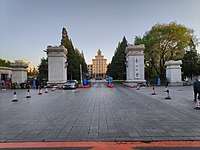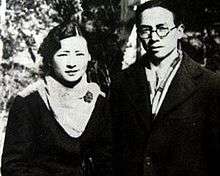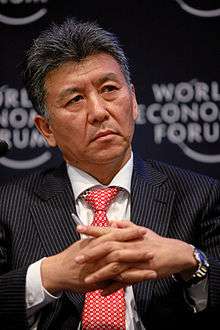Northeastern University (China)
Northeastern University (NEU; simplified Chinese: 东北大学; traditional Chinese: 東北大學; pinyin: Dōngběi Dàxué) is a public university in Shenyang, Liaoning province with strengths in engineering and architecture. It is known for its prominent role in the information technology industry.
东北大学 | |
 | |
| Motto | 自强不息,知行合一[1] |
|---|---|
Motto in English | Striving endlessly for improvement, combining knowledge and action as one. |
| Type | Public |
| Established | 1923 |
| Affiliation | Project 211, Project 985, Double First Class University Plan |
| President | Zhao Ji (赵继) |
| Party Secretary | Xiong Xiaomei (熊晓梅) |
Academic staff | 4,538 |
| Undergraduates | 29,872 |
| Postgraduates | 11,364 |
| 3,850 | |
| Location | , , China |
| Colors | NEU blue |
| Website | english |
The university's academic motto is "Striving endlessly for self-improvement, combining knowledge and action as one" (Chinese: 自强不息,知行合一), the first half of which is from the ancient Chinese classic Yijing, and the latter is a direct quote from Wang Yangming and also translated as "thinking-doing to theory" by the NEU's Engineering faculty.
Having built China's first electronic analog computer, university research park, and university-run commercial enterprise, Northeastern is now part of a government plan to revitalize the Northeast China economy with a focus on high-tech manufacturing. Its alumni include the founder and CEO of Neusoft, the largest Chinese IT and software outsourcing corporation, the first Olympic athlete to represent China, in the 1932 Summer Olympics, and the founder of Amnesty International in Taiwan.
With a total enrollment of over 20,000 students, Northeastern has received significant government funding through the 211 Project and 985 Project, initiatives which sought to elevate the research standards of rising Chinese universities. In 2017, Northeastern was selected by the Chinese Ministry of Education as a Class B institution in the Double First Class University Plan, a major government initiative to comprehensively develop a group of elite universities into "world-class institutions" by 2050.[2]
History

The Northeastern University was founded on April 26, 1923 in Shenyang (then known as Fengtian), in response to warlord Zhang Zuolin's order in early 1921 to establish tertiary education and expand the talent pool of the Northeast. After Zhang Zuolin's assassination by the Japanese, his son Zhang Xueliang inherited the command of the Northeast, assumed the title of co-president of the university in August 1928, and became the university's most important financial and political patron in its early history. With Zhang's generous support, the institution attracted top scholars and educators from throughout the nation (e.g. Zhang Shizhao, Huang Kan, Liang Sicheng and Lin Huiyin), and quickly developed into a top-tier comprehensive university, with six schools for science, engineering, humanities, law, agriculture and education. By the end of the 1920s, it was the biggest and best-resourced tertiary institute in China, with a budget tripling that of the Peking University.
Less than a decade after the university was founded, the Imperial Japanese Kwantung Army attacked and captured Shenyang on September 18, 1931, and then proceeded to invade and annex all of Northeast China and reorganized the region into the puppet state of Manchukuo. the Northeastern University was forced to evacuate its campus after the fall of Shenyang and became the first exiled university in Chinese history, being relocated to Beiping during the height of the December 9th Movement, with its more than 70 students continuing their study at the then-private Nankai University. Five years later, the university was relocated further west to Xi'an in 1936, then temporarily to a borrowed Henan University campus at Kaifeng in January 1937, before renamed National Northeastern University (國立東北大學) and relocated back to Xi'an in June.
After the Marco Polo Bridge Incident on July 7, 1937, the Japanese launched a full-scale invasion of North China. Like many other national universities in China during the Second Sino-Japanese War, the Northeastern University was again displaced in 1938 and relocated further away from the approaching front line to Santai in Sichuan, where it remained for the next 8 years and contributed to the establishment of the National Northwest Institute of Technology (國立西北工學院, the precursor of Northwestern Polytechnical University and Tianjin University). After Japan's surrender, the university returned to its original campus in Shenyang in May 1946, while some staff of its Education faculty remained in Sichuan and later became the Sichuan Normal University and China West Normal University.
After the establishment of the People's Republic of China in 1949, Northeastern University was renamed Northeast Institute of Technology (东北工学院, NIT) in August 1950 and became primarily an engineering school, before finally reverting back to its original name of Northeastern University on March 8, 1993.
Northeastern University was selected to participate in the 211 Project and Project 985, nationwide government initiatives to expand and modernize the Chinese university system, including significant government funding and subsidies for constructing state-of-the-art academic facilities. The university is also part of the national government's initiative to replace Northeast China's heavy manufacturing industry with a modern high-tech manufacturing economy.
Academics
Northeastern University consists of the School of Liberal Arts and Law, the School of Business Administration, the School of Sciences, the School of Resources and Civil Engineering, the School of Materials Science and Metallurgy, the School of Mechanical Engineering and Automation, the School of Information Science and Engineering, Sino-Dutch School of Biomedical and Information Engineering, and the Department of Foreign Languages. It has 46 undergraduate programs, 53 master's degree programs, and 23 doctoral degree programs, as well as an adult education program.
Rankings
According to the "Academic Ranking of World Universities" published at "www.shanghairanking.com", the world ranking of NEU in 2018 is at 401-500. In the same year, under the subject "Metallurgical Engineering" NEU has been ranked 5 globally .
| University rankings | |
|---|---|
| Global – Overall | |
| THE World[3] | 801-1000 |
In 2017, Times Higher Education ranked the university within the 801-1000 band globally.[3]
Campus
There are currently two campuses in Shenyang and one campus in Qinhuangdao, Hebei province.
Northeastern's two campuses in Shenyang are referred to as South Lake Campus and Hunnan Campus. The South Lake Campus was built in 1952 and spans 2.03 million square meters. The Hunnan Campus was built in 2013 and occupies 0.94 million square meters.
The official name of its Qinhuangdao campus is Northeastern University at Qinhuangdao. The campus was built in 1976 and occupies 0.46 million square meters.
Notable people

Faculty
- Zhang Xueliang, the warlord who controlled Northeast China during the Second Sino-Japanese War and instigated the Xi'an Incident, and was President of Northeastern University
- Liang Sicheng, the "father of modern Chinese architecture", founded the Department of Architecture at Northeastern
- Lin Huiyin (Phyllis Lin), the first female architect in modern China, taught in the Department of Architecture
- Ding Lieyun, management scientist and educator, President of Northeastern University (2011-2014) and elected a member of the Chinese Academy of Engineering

Prominent alumni
- Liu Jiren '80, computer scientist and CEO of Neusoft Group (an acronym of "Northeastern University Software"), the largest IT and software outsourcing corporation in China
- Bo Yang, author and dissident of the Kuomintang dictatorship during Taiwan's White Terror period, and founder of Amnesty International in Taiwan
- Liu Changchun, sprinter who was the first athlete to represent China (as the Republic of China) in the Olympic Games during the 1932 Summer Olympics
- Shan Tianfang, famous Chinese pingshu performer and member of the China Society for Literature Popular Research
- Guo Xiaochuan, Chinese poet and communist Eighth Route Army soldier considered a leading figure in the "political lyric poetry" style
See also
- Neusoft Group (acronym of "Northeastern University Software"), the largest IT and software outsourcing corporation in China
- Double First Class University Plan, a major government initiative to cultivate an elite group of Chinese universities to "world-class" status by 2050
References
- 校标校名校训校风校歌. Archived from the original on July 14, 2014. Retrieved July 3, 2014.
- 教育部 财政部 国家发展改革委 关于公布世界一流大学和一流学科建设高校及建设 学科名单的通知 (Notice from the Ministry of Education and other national governmental departments announcing the list of double first class universities and disciplines).
- World University Rankings 2017-2018
External links
| Wikimedia Commons has media related to Northeastern University (China). |